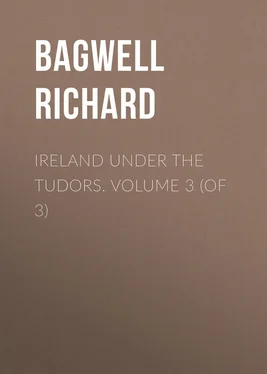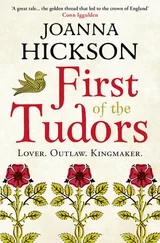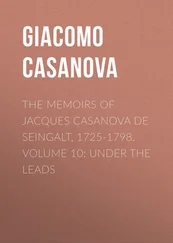Richard Bagwell - Ireland under the Tudors. Volume 3 (of 3)
Здесь есть возможность читать онлайн «Richard Bagwell - Ireland under the Tudors. Volume 3 (of 3)» — ознакомительный отрывок электронной книги совершенно бесплатно, а после прочтения отрывка купить полную версию. В некоторых случаях можно слушать аудио, скачать через торрент в формате fb2 и присутствует краткое содержание. Жанр: foreign_antique, foreign_prose, на английском языке. Описание произведения, (предисловие) а так же отзывы посетителей доступны на портале библиотеки ЛибКат.
- Название:Ireland under the Tudors. Volume 3 (of 3)
- Автор:
- Жанр:
- Год:неизвестен
- ISBN:нет данных
- Рейтинг книги:3 / 5. Голосов: 1
-
Избранное:Добавить в избранное
- Отзывы:
-
Ваша оценка:
- 60
- 1
- 2
- 3
- 4
- 5
Ireland under the Tudors. Volume 3 (of 3): краткое содержание, описание и аннотация
Предлагаем к чтению аннотацию, описание, краткое содержание или предисловие (зависит от того, что написал сам автор книги «Ireland under the Tudors. Volume 3 (of 3)»). Если вы не нашли необходимую информацию о книге — напишите в комментариях, мы постараемся отыскать её.
Ireland under the Tudors. Volume 3 (of 3) — читать онлайн ознакомительный отрывок
Ниже представлен текст книги, разбитый по страницам. Система сохранения места последней прочитанной страницы, позволяет с удобством читать онлайн бесплатно книгу «Ireland under the Tudors. Volume 3 (of 3)», без необходимости каждый раз заново искать на чём Вы остановились. Поставьте закладку, и сможете в любой момент перейти на страницу, на которой закончили чтение.
Интервал:
Закладка:
Sir John Perrott was in no great hurry to take up his government, and five months elapsed between the date of his patent and his arrival in Ireland. It was rumoured in Dublin that he would not come at all. In England and in Ireland, his choleric temper involved him in frequent quarrels, and it is probable that delay was caused by some of these. His instructions did not greatly differ from those which Elizabeth was wont to give to her representatives. To increase the revenue without oppressing the subject, to reduce the army without impairing its efficiency, to punish rebels without driving them to desperation, and to reward loyal people without cost to the Crown – these were the usual orders, and they were easier to give than to carry out. Perrott had already tasted the misery of Irish official life, and his half-brother, Sir Henry Jones, warned him that he would now be envied more than ever, and truly prophesied that he would never see him again. 114 114 The memorial of the Privy Council and the Queen’s instructions are both printed in Desiderata Curiosa Hibernica ; see also Perrott’s Life , and Ormonde to Burghley, March 13, 1584. Perrott landed at Dalkey, June 9, and was sworn in by Loftus in St. Patrick’s on the 21st.
The settlement of Munster was, of course, the most important part of Perrott’s work, and he was probably chosen because he knew that province well. He was ordered to take Ormonde with him, and to give his opinion due weight. The Earl was directed to come to England as soon as he had given all the information in his power. Tired of the delay, and fearing lest he should be undermined at court, Ormonde slipped over to Wales and met the new Lord Deputy, who handed him a gracious letter from the Queen. This somewhat reassured him, but he complained of hard dealing in being displaced before he had made known in England in how good and quiet order he had left his late charge. At Carew Castle he received orders to accompany his host to Ireland, and complied, though he always hated a sea-passage. He felt that his personal interests were safe in the hands of his old companion in arms, but thought it a little late to consult him about Munster. The journey would only increase his debts, unless, as he hinted to Burghley, the Queen made it worth his while; ‘but over I will, God willing, and back again, seeing you wish it should be so.’ 115 115 Ormonde to Burghley, March 13, 1584 (from Carrick); docquet of letter, April 4; Ormonde to Burghley, May 19 (from Abermorles); June 4, (from Carew).
Perrott made a speech to the great crowd assembled at his installation. He said that the Queen held her subjects of Ireland equal with those of England, and that her care, as well as his own, was to make them equally happy by means of good government. Among other sayings it was noted as worthy of remark, that he wished to suppress ‘the name of a churl and crushing of a churl,’ and to substitute such terms as husbandman, franklin, or yeoman. ‘This,’ says Secretary Fenton, ‘was so plausible to the assembly, that it was carried from hand to hand throughout the whole realm in less time than might be thought credible if I should express it.’
Next day the Lord Deputy ordered a general hosting, according to the ancient custom, for six weeks, beginning on August 10. Tara was assigned as the place of meeting, and Tyrone, Ormonde, Barrymore, and Mountgarret were among those who signed the order. Perrott devoted a few days to the Council, whose help was necessary to enable him to gather up the reins. Fenton found him ‘affable and pleasing, seeking by good means to recover the hearts of the people that were somewhat estranged, quick and industrious, careful of her Majesty’s profit, sincere, just, and no respecter of persons.’ Indeed, he did not respect persons enough. Wallop, whose office of Vice-Treasurer made him the most important man next to the Viceroy, and who had been virtual chief governor for nearly two years past, was on the point of quarrelling with him at the outset, but forced himself to make allowance for the Deputy’s passionate disposition. With Loftus, who had lately been Wallop’s colleague in the government, and who was still Lord Chancellor, Perrott was at open war in a very short time. 116 116 Order for a hosting, June 22, 1584; Wallop to Walsingham, July 9; Fenton to Walsingham, July 10.
John Norris, the most famous of Lord Norris of Rycot’s six good sons, had been appointed Lord President of Munster. Bingham, whom Perrott knighted at his installation, was, at the same time, made Chief Commissioner of Connaught in Maltby’s room, but with inferior emoluments. The Lord Deputy proposed to settle the two provincial governors in their places at once, and to return in time for the hosting at Tara. Norris went straight to Munster, and Bingham accompanied Perrott to the West. All the chief men of Connaught and Thomond flocked dutifully to the Viceroy, and he decided controversies to their satisfaction. The sheriffs maintained great trains of followers, who became a scourge to the country, and this abuse was sternly repressed. Clanricarde and the rest were ready to make some permanent arrangement with their tenants, ‘so as I,’ said Perrott, ‘would take a time among them to perform it, which, if I have quietness, I will do hereafter.’ He was not fated to have much quietness. Bingham’s first impression of his province was that the Irish should be won by plausible means. It was, he said, their habit to acknowledge their duty to her Majesty on the arrival of a new Lord Deputy, ‘more for fashion than for faithful obedience.’ The fashion and the want of faithful obedience have both continued to our own time. Bingham saw clearly that the Queen’s government would never be really popular – ‘the people, for every small trifle, are daily suggesting that they are intolerably oppressed and extorted upon.’ His advice was to keep them down by steady but gentle pressure, ‘so that by having too little the country may not be waste, and by having too much the people may not rebel. Nevertheless, my meaning is rather to better their estate than to make it worse.’ He understood the problem, but he was not much more successful than others in finding the solution. 117 117 Henry Sheffield to Burghley, July 12, 1584; Memorial for Mr. Edward Norris, Aug. 6; Bingham to Burghley, Aug. 7.
John Long, a Cambridge man and a Londoner, was consecrated Primate on the day on which Perrott left Dublin. As a special mark of favour the new Deputy had been allowed to fill the vacant see. Loftus desired the appointment of Thomas Jones, Dean of St. Patrick’s, who ultimately succeeded him in Dublin. Not much, either good or bad, is recorded of Archbishop Long, but he became the chief pastor of a most forlorn flock. ‘There are here,’ says an English visitor to Ireland, ‘so many churches fallen down, so many children dispensed withal to enjoy the livings of the Church, so many laymen – as they are commonly termed – suffered to hold benefices with cure, so many clergymen tolerated to have the profit of three or four pastoral dignities, who, being themselves unlearned, are not meet men, though they were willing, to teach and instruct others, as whoso beholdeth it must not choose but make it known.’ 118 118 William Johnes to Walsingham, July 14, 1584.
Many of the chief men of Munster came to Perrott at Limerick, and the rest signified their intention of attending him at Cork. But news arrived that Scots had landed in Ulster, and the Lord Deputy, who liked fighting better than anything, turned aside from Limerick, crossed Tipperary, and returned by Kilkenny to Dublin. Ormonde and Norris, together with all the late rebels whom the Earl had pardoned, were ordered to make ready for the northern enterprise. Malachi O’Moloney, Papal Bishop of Kilmacduagh, was suspected of having a hand in the Ulster plot; he came to Perrott, renounced the Pope, and took the oath of supremacy; but there can be little doubt that this conversion was insincere. A messenger from Tirlogh O’Neill had certainly been in Munster, but found it impossible to stir up the embers of the Desmond rebellion. Lord Fitzmaurice told him plainly that no one would stir as long as Perrott and Ormonde were in Ireland. The Lord Deputy could therefore turn his back safely on Munster, and he hastened to Dublin to make preparations for repelling what he believed to be a serious invasion. 119 119 Perrott’s Memorial for Mr. Edward Norris, Aug. 6, 1584.
Интервал:
Закладка:
Похожие книги на «Ireland under the Tudors. Volume 3 (of 3)»
Представляем Вашему вниманию похожие книги на «Ireland under the Tudors. Volume 3 (of 3)» списком для выбора. Мы отобрали схожую по названию и смыслу литературу в надежде предоставить читателям больше вариантов отыскать новые, интересные, ещё непрочитанные произведения.
Обсуждение, отзывы о книге «Ireland under the Tudors. Volume 3 (of 3)» и просто собственные мнения читателей. Оставьте ваши комментарии, напишите, что Вы думаете о произведении, его смысле или главных героях. Укажите что конкретно понравилось, а что нет, и почему Вы так считаете.












